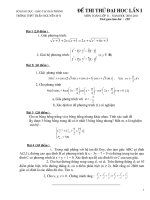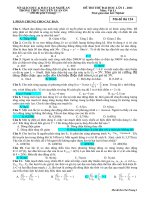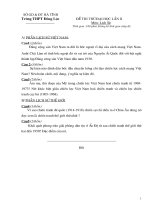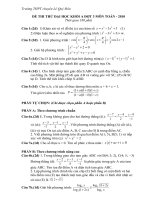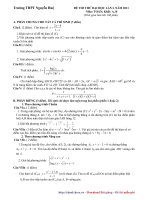Đề và đáp án thi thu DH lần 2
Bạn đang xem bản rút gọn của tài liệu. Xem và tải ngay bản đầy đủ của tài liệu tại đây (198.34 KB, 8 trang )
SỞ GIÁO DỤC VÀ ĐÀO TẠO THANH HOA M· ® Ò th i : 001
TRƯỜNG THPT THACH THANH I
ĐỀ THI KHOI NĂM 2010
Môn: TIẾNG ANH; Líp: 12
Thời gian làm bài: 90 phút, không kể thời gian phát đề
(Đề thi có 06 trang)
Họ, tên thí sinh:
Số báo danh:
ĐỀ THI GỒM 80 CÂU (TỪ QUESTION 1 ĐẾN QUESTION 80) DÀNH CHO TẤT CẢ THÍ SINH.
Mark the letter A, B, C, or D on your answer sheet to indicate the correct answer to each of the
following questions, questions from 1 to 30
Question 1: The boy did his homework
A. by himself B. his own self C. on himself D. by his own.
Question 2: Peter’s got so________to opera that it has become a constant companion of her life
A. used to listening. B. used to listen. C. used in listening. D. use to listen.
Question 3: A: “May I use your car for a few days?” B: "_ "
A. It's up to you B. Not at all
C. You're welcome D. Welcome you.
Question 4: ________being tired, I went for a picnic with my family.
A. That B. Since C. Although D. Despite
Question 5: Preparing for a job interview can be very
.
A. stress B. stressful C. stressed D. stressing
Question 6: This knife is very blunt. It needs
A. sharpeningly B. sharpen C. sharpening D. sharply
Question 7: Not until the end of the 19th century
become a scientific discipline.
A. plant breeding has B. did plant breeding C. plant breeding had D. has plant breeding
Question 8: This road ,
., is narrow and winding
A. which the two villages are joined B. which the two villages are joining
C. which joins the two villages D. joins the two villages
Question 9: I am going to_____ my dress dry- cleaned
A. make B. send C. get D. take
Question 10: She is very absent-minded: she
her cellphone three times!
A. has lost B. loses C. was losing D. had lost
Question 11: - "You look ill. What’s wrong with you?"
- " "
A. No, sir. B. No matter. C. Not at all. D. Nothing.
Question 12: He is unhappy because his parents do not_________very well.
A. get over B. get off C. get on D. get away
Question 13: Although the exam was difficult,
the students passed it.
A. most of B. none of C. a few D. a lot
Question 14: - "You really have a beautiful blouse, Mary. I have never seen such a perfect thing on you"
- " "
A. Good idea. Thanks for the news. B. Thanks, Tom. That’s a nice compliment
C. Well, that's very surprising! D. Yes, it's our pleasure.
Question 15: By
the household chores, he can help his mother after going home from school.
A. ordering B. doing C. having D. making
Question 16: The youths nowadays have many things to do in their
time.
A. leisure B. entertainment C. fun D. amusement
Question 17: I was not _________to go to parties in the evening until I reached the age of eighteen.
A. permitted B. permission C. permitting D. permit
1
Question 18: Working hours will fall to under 35 hours a week,
?
A. will they B. won't they C. won't it D. will it
Question19: This factory produced
motorbikes in 2008 as in the year 2006.
A. twice as many B. as twice as many C. as twice many D. as many as twice
Question 20: He runs a business,
he proves to have managerial skills.
A. however B. otherwise C. and D. despite
Question 21. at his lessons, still he couldn’t catch up with his classmates.
A. Hardly as he worked B. Hard as he worked
C. Hard as he does D. Hard as he was
Question 22. My daughter saw an elephant this morning but she …………….one before.
A. had never seen B. has never seen C. never sees D. never had seen
Question 23. I am reading this novel. By the time you come back from work I………
A. shall finish B. will finish C. shall have finished D. have finished
Question 24. The whole village was wiped out in the bombing raids.
A. removed quickly B. cleaned well
C. changed completely D. destroyed completely
Question 25. Delegates will meet with_______from industry and the government.
A. represented B. representative C. representatives D. representers
Question 26. Have you really got no money_______the fact that you've had a part-time job this term?
A. although B. in spite of C. because of D. in case
Question 27. Last week, my professor promised that he ……… today.
A. would come B. will come C. comes D. coming
Question 28. Not until home that he had taken someone else's bike.
A. he got/ he realized B. he got/ did he realize
C. did he get/ he realized D. he got/ he did realize
Question 29. There are many ways……….to Rome
A. is leading B. are leading C. leading D. led
Question 30. He was teacher!
A. how good a B. so good a C. so a good D. what a good
Mark the letter A, B, C, or D on your answer sheet to indicate the word that differs from the rest in
the position of the main stress in each of the following questions, questions from 31 to 35
Question 31: A. Titanic B. maximum C. attractive D. opinion
Question 32: A. interview B. technical C. character D. remember
Question 33: A. international B. agricultural C. sociology D. examination
Question 34: A. compulsory B. technology C. curriculum D. independent
Question 35: A. identity B. institution C. preferential D. engineering
Mark the letter A, B, C, or D on your answer sheet to show the underlined part that needs correction.
questions from 36 to 40
Question 36: I would rather that they do not travel during the bad weather, but they insist that
A B C
they must return home today.
D
Question 37: The man, of whom t h
e red car is parked in fr o nt of our house, is a famo u s physician in this town.
A B C D
Question 38: The better you are at English, more chance you have to get a job with international companies
A
B C
D
.
Question 39: If either of you take a vacation, we will not be able to finish the work.
A B C D
Question 40: With this type of exercise, reads the questions first and then read the text to find the
A B C
correct answer.
D
2
Read the following passage and mark the letter A, B, C, or D on your answer sheet to indicate the
correct answer to each of the questions from 41 to 50.
According to the best evidence gathered by space probes and astronomers, Mars is an inhospitable
planet, more similar to Earth’s Moon than to Earth it self – a dry , stark , seemingly lifeless world. Mars’ air
pressure is equal to Earth’s at an altitude of 100,000 feet. The air there is 95 percent carbon dioxide.
Mars has no ozone layer to screen out the sun’s lethal radiation. Daytime temperatures may reach
above freezing, but because the planet is blanketed by the mere wisp of an atmosphere, the heat radiates back
into space. Even at the equator, the temperature drops to -50C ( -60F ) at night. Today there is no liquid water,
although valleys and channels on the surface show evidence of having been carved by running water. The polar
ice caps are made of frozen water and carbon dioxide, and water may be frozen in the ground as permafrost.
Despite these difficult conditions, certain scientists believe that there is a possibility of trans-forming
Mars into a more Earth-like planet. Nuclear reactors might be used to melt frozen gases and eventually build up
the atmosphere. This in turn could create a “greenhouse effect” that would stop heat from radiating back into
space. Liquid water could be thawed to from a polar ocean. Once enough ice has melted, suitable plants could
be introduced to build up the level of oxygen in the atmosphere so that, in time, the planet would support animal
life from Earth and even permanent human colonies. “This was once thought to be so far in the future as to be
irrelevant,” said Christopher Mckay, a research scientist at NASA. “But now it’s starting to look practical. We
could begin word in four or five decades.”
The idea of “terra-forming” Mars, as enthusiasts call it, has its roots in science fiction. But as
researchers develop a more profound understanding of how Earth's ecology supports life, they have begun to
see how it may be possible to create similar conditions on Mars. Don’t plan on homesteading on Mars any time
soon, though. The process could take hundreds or even thousands of years to complete and the cost would be
staggering.
Question 41.With which of the following is the passage primarily concerned?
A. The possibility of changing the Martian environment. B. The challenge of interplanetary travel.
C. The advantages of establishing colonies on Mars. D. The need to study the Martian ecology.
Question 42. The word “stark” in paragraph 2 is closest in meaning to.
A. harsh B. unknown C. dark D. distant
Question 43. The word “there” in paragraph 2 refers to.
A. a point 100 miles above the Earth B. the Earth’s Moon C. Mars D. outer space
Question 44. Which of the following does the author NOT list as a characteristic of the planet Mars that would
make colonization difficult?
A. There is little liquid water. B. Daytime temperatures are dangerously high.
C. The sun’s rays are deadly. D. Night time temperatures are extremely.
Question 45. According to passage, the Martian atmosphere today consists mainly of.
A. carbon dioxide B. oxygen C. ozone D. water vapour
Question 46. It can be inferred from the passage that the “greenhouse effect” mentioned in paragraph 3 is
A. the direct result of nuclear reactions. B. the cause of low temperatures on Mars.
C. caused by the introduction of green plants. D. possible means of warming Mars.
Question 47. The word “suitable”in paragraph 3 is closest in meaning to
A. resistant B. altered C. appropriate D. native
Question 48. According to Christopher Mckay, the possibility of transforming Mars
A. could only occur in science fiction stories. B. will not begin for hundreds, even thousands of years.
C. is completely impractical. D. could be started in forty to fifty years.
Question 49. The phrase “more profound” in paragraph 4 is closest in meaning to
A. deeper B. more practical C. more up-to-date D. brighter
Question 50. According to the article, the basic knowledge need to transform Mars comes from
A. the science of astronomy B. a knowledge of Earth’s ecology
C. data from space probes D. science fiction stories
3
Choose A, B, C or D to show the best way of making a sentence from the works and phrases given.
questions from 51 to 60
Question 51: Inhabitants / this city /all / kill / one week / volcanic disaster.
A. The habitants of this city all were killed after one week in volcanic disaster.
B. The habitants of this city all were killed after one week in a volcanic disaster.
C. The habitants of this city all were killed within one week in volcanic disaster.
D. The habitants of this city were all killed in one week in volcanic disaster.
Question 52: English / become / effective / medium / international / communication
A. English has become an international communication of effective medium.
B. English has become an effective international communication of medium.
C. English has become an effective medium of international communication.
D. English has become an effective medium of become international communication.
Question 53: In Paris/ Hemingway meet/ many / his old friends / encourage / his writing / career.
A. In Paris, Hemingway encouraged many of his old friends who met him in his writing career.
B. In Paris, Hemingway met many of his old friends, who encouraged him in his writing career
C. In Paris, Hemingway encouraged his writing career which many of his old friends met.
D. In Paris, Hemingway encouraged his writing career to meet many of his old friends.
Question 54: I / grateful / you / send / latest catalogue / price lists.
A. I am grateful if you send me the latest catalogue of price lists.
B. I would be grateful to you to send me the latest catalogue of price lists.
C. I would be grateful if you could send me the latest catalogue of price lists.
D. I would be grateful if you could send to me the latest catalogue of price lists.
Question 55: rain / every day / have / spend / most / time / indoors.
A. It rained every day, so we had to spend most of time indoors.
B. It rained every day, so we had to spend most of our time indoors.
C. It rained nearly every day, so we had to spend most time indoors.
D. It rained every day, so we have spent most of time indoors.
Mark the letter A, B, C or D on your answer sheet to indicate the sentence that is closest in meaning
to the original sentence in each of the following questions, questions from 56 to 60
Question 56: “Let’s go shopping”!
A. She suggests going shopping B. She allows us to go shopping
C. She says we can go shopping D. She agrees to go shopping with him
Question 57: “I’ll give you a lift home if you like”
A. He offered to give me a lift home.
B. I liked him to give me a lift home.
C. He could install a lift my home.
D. If I liked, he would install a lift in my home.
Question 58: The boy was too fat to run far.
A. The boy was very fat and couldn’t run far.
B. The boy’s fatness didn’t stop him running far.
C. The boy had to run a lot because he was fat.
D. The boy became ill because he was fat.
Question 59: If you didn’t cheat in the exam, you wouldn’t be punished.
A. You were not punished as you didn’t cheat in the exam.
B. You didn’t cheat in the exams so as not be punished.
C. Don’t cheat in the exam and you won’t be punished.
D. You never cheat in the exam, so you are not punished.
4
Question 60: Julia forgot to do her homework.
A. Julia did her homework but she didn’t remember.
B. Julia forgot doing her homework.
C. Julia didn’t do her homework as she didn’t remember.
D. Somebody did her homework for Julia but she forgot it.
Read the following passage and mark the letter A, B, C, or D on your answer sheet to indicate the
correct answer to each of the questions from 61 to 70.
Recent technological advances in manned and unmanned vehicles, along with breakthroughs in
satellite technolog y and computer equipment, have overcome some of the limitations of divers and diving
equipment for scientists doing research on the great oceans of the world. Without a vehicle, divers often
became sluggish, and their mental concentration was severely limited. Because undersea pressure
affects their speech organs, communication among divers has always been difficult or impossible. But
today, most oceanographers avoid the use of vulnerable human divers, preferring to reduce the risk to
human life and make direct observations by means of instruments that are lowered into the ocean, from
samples take from the water, or from photographs made by orbiting satellites. Direct observations of the
ocean floor can be made not only by divers but also by deep -diving submarines in the water and even by the
technology of sophisticated aerial photography from vantage points above the surface of more than seven
miles and cruise at depths of fifteen thousand feet. In addition, radio -equipped buoys can be operated
by remote control in order to transmit information back to land-based laboratories via satellite. Particularly
important for ocean study are data about water temperature, currents, and weather. Satellite photographs can
show the distribution of sea ice, oil slicks, and cloud formations over the ocean. Maps created from satellite
pictures can represent the temperature and the color of the ocean's surface, enabling researchers to
study the ocean currents from laboratories on dry land. Furthermore, computers help oceanographers to
collect, organize, and analyze data from submarines and satellites. By
creating a
model of the ocean's
movement and characteristics, scientists can predict the patterns and possible effects of the ocean on the
environment.
Recently, many oceanographers have been relying more on satellites and computers than on
research ships or even submarine vehicles because they can supply a greater range of information more
quickly and more effectively. Some of humankind's most serious problems, especially t h o s e concerning
energy and food, may be solved with the help of observations made possible by this new technology.
Question 61. With what topic is the passage primarily concerned?
A. Communication among drivers B. Technological advances in oceanography
C. Direct observation of the ocean floor D. Undersea vehicles
Question 62. The word "sluggish" is closest in meaning to
A. nervous B. confused C. slow moving D. very weak
Question 63. Drives have had problems in communicating underwater because
A. the pressure affected their speech organs B. the vehicles they used have not been perfected
C. they did not pronounce clearly D. the water destroyed their speech organs
Question 64. This passage suggests that the successful exploration of the ocean depends upon
A. the limitations of diving equipment B. radios that divers use to communicate
C. controlling currents and the weather D. vehicles as well as divers
Question 65. Undersea vehicles
A. are too small for a man to fit inside B. are very slow to respond
C. have the same limitations that divers have D. make direct observations of the ocean floor
Question 66. The word "cruise" could best be replaced by
A. travel at a constant speed B. function without problems
C. stay in communication D. remain still
5
Question 67. How is a radio-equipped buoy operated?
A. By operators inside the vehicle in the part underwater
B. By operators outside the vehicle on a ship
C. By operators outside the vehicle on a diving plat form
D. By operators outside the vehicle in a laboratory on shore
Question 68. The word “information” is closest in meaning to
A. data B. articles C. samples D. photographs
Question 69. Which of the following are NOT shown in satellite photographs?
A. The temperature of the ocean's surface B. Cloud formations over the ocean
C. A model of the ocean's movements D. The location of sea ice
Question 60. The words those refers to
A. ships B. vehicles C. problems D. computers
Read the following passage and mark the letter A, B, C, or D on your answer sheet to indicate the
correct answer to each of the questions from 71 to 80.
Public transport plays a central role in any (71) ________ urban transport system. In developing
(72)____________ where at least 16 cities are expected to have more than 12 million people each by the end of
this decade, failing to give priority to public transport would be (73) ________ . The term ‘public transport’ covers
many different types of vehicles, but most commonly refers to (74) ________ and trains. Rail services fall into
four major categories, rapid rail (also called the underground, tube, metro, or subway), which operates on
exclusive rights-of-in (75) ________ or on elevated tracks; trams, which more with other traffic on regular
(76) ________; light rail, which is a quieter, more modern version of trams that can run either on
exclusive rights-of-way or with other traffic; and suburban or regional trains, which (77) ________ a city with
surrounding areas. The recent trend in many (78) ________ is toward light rail over ‘heavy’ rapid rail systems.
Whereas metros require exclusive rights-of-way, which often means building costly elevated or underground
lines and stations, light rail can be build on regular city streets.
Public transport modes vary in fuel use and emissions and in the space they require, but if carrying reasonable
(79) _______of passengers, they all perform (80) ________than single-occupant private cars on each of these
counts.
Question 71. A. efficient B. ancient C. rural D. western
Question 72. A. schools B. roads C. countries D. villages
Question 73. A. costly B. cheap C. disastrous D. impossible
Question 74. A. cars B. bicycles C. buses D. horses
Question 75. A. tunnels B. burrows C. caves D. dungeons
Question 76. A. rails B. streets C. rivers D. footpaths
Question 77. A. connect B. glue C. send D. subordinate
Question 78. A. villages B. trams C. cities D. governments
Question 79. A. amounts B. numbers C. weights D. luggage
Question 80. A. faster B. slower C. worse D. better
The end.
6
DAP AN ĐỀ THI KHOI NĂM 2010
Môn: TIẾNG ANH; Líp: 12
Ma de: 001
1 A 21 B 41 A 61 B
2 A 22 A 42 A 62 C
3 C 23 C 43 C 63 A
4 D 24 D 44 B 64 D
5 B 25 C 45 A 65 D
6 C 26 B 46 D 66 A
7 B 27 A 47 C 67 D
8 C 28 B 48 D 68 A
9 C 29 C 49 A 69 C
10 A 30 B 50 B 70 C
11 D 31 B 51 D 71 A
12 C 32 D 52 C 72 C
13 A 33 D 53 B 73 C
14 B 34 D 54 C 74 C
15 B 35 A 55 B 75 A
16 A 36 B 56 A 76 B
17 A 37 A 57 A 77 A
18 B 38 C 58 A 78 C
19 A 39 B 59 C 79 B
20 C 40 A 60 C 80 D
7
8
